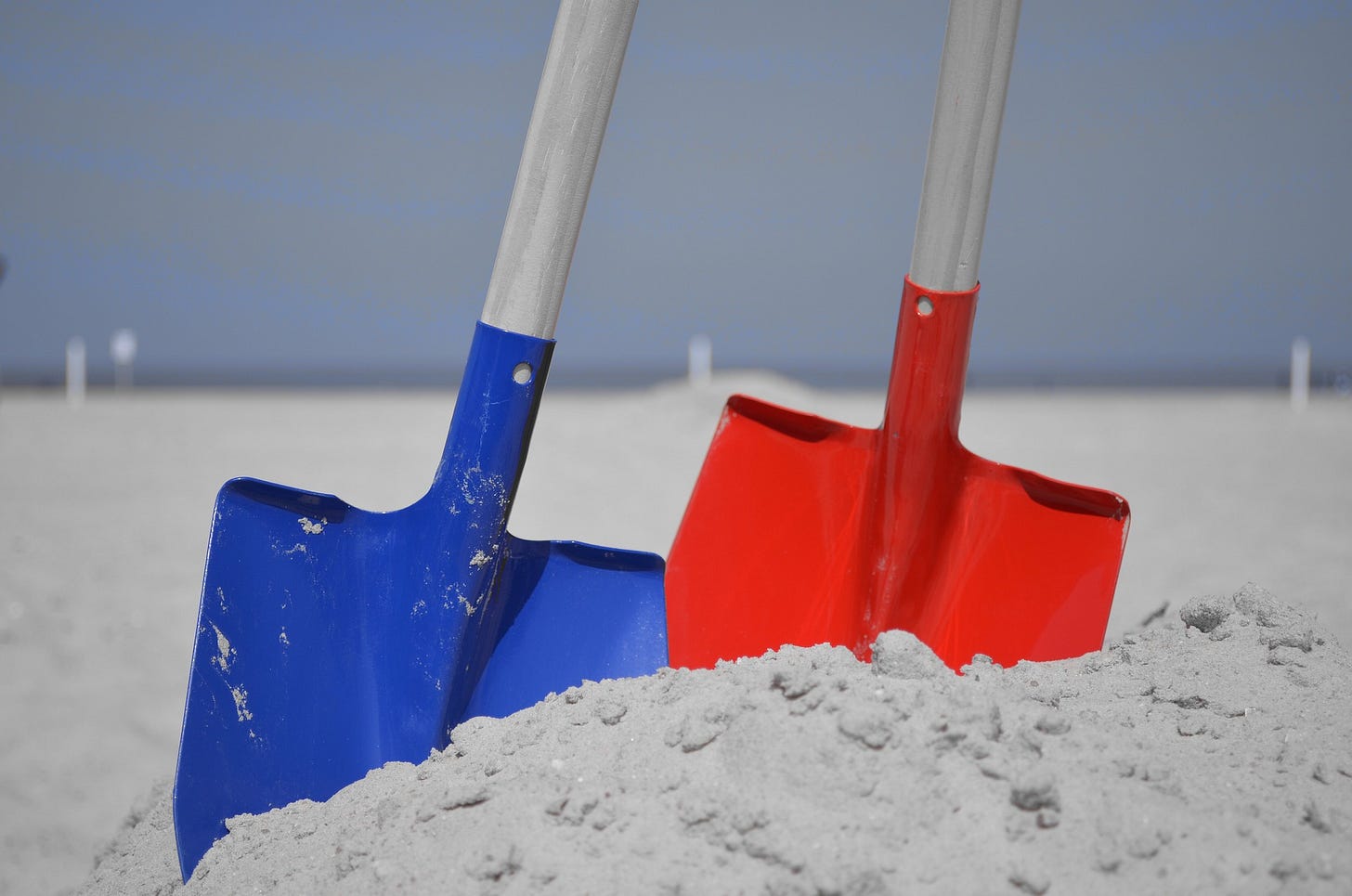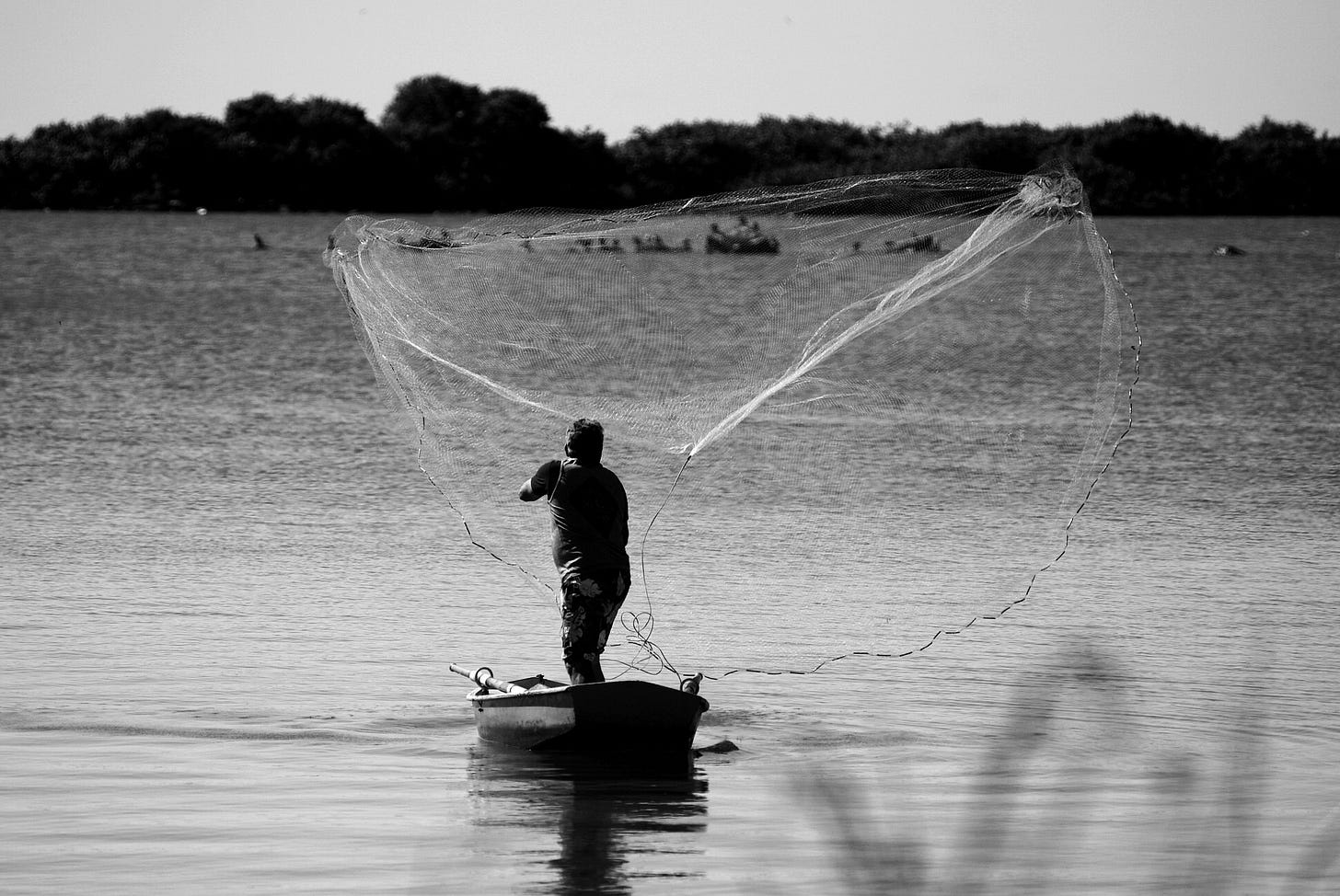Introduction
Thank you for reading the Lectionary in Solentiname. Here, we are transported in time and place to read the gospel alongside the peasants of Nicaragua living under dictatorship. By reading Ernesto Cardenal’s The Gospel in Solentiname, we get to keep their memory alive and learn how they understood the good news of Jesus Christ. You can read Cardenal’s introduction, where he provides more context to these readings, here.
Last week, we covered the first chunk of Jesus’s parables about the Kingdom of God. You can read up about it here. This week, we are finishing with those parables, which I split up because the lectionary reading for this week had no corresponding passage in The Gospel in Solentiname.
Lectionary Reading
Matthew 13: 44-52
“The kingdom of heaven is like treasure hidden in a field, which a man found and reburied; then in his joy he goes and sells all that he has and buys that field.
“Again, the kingdom of heaven is like a merchant in search of fine pearls; on finding one pearl of great value, he went and sold all that he had and bought it.
“Again, the kingdom of heaven is like a net that was thrown into the sea and caught fish of every kind; when it was full, they drew it ashore, sat down, and put the good into baskets but threw out the bad. So it will be at the end of the age. The angels will come out and separate the evil from the righteous and throw them into the furnace of fire, where there will be weeping and gnashing of teeth.
“Have you understood all this?” They answered, “Yes.” And he said to them, “Therefore every scribe who has become a disciple in the kingdom of heaven is like the master of a household who brings out of his treasure what is new and what is old.”
Solentiname Reading
We next had a very brief parable:
The kingdom of heaven is like a treasure hidden in a plot of ground. A man finds the treasure and hides it again right where it was, and filled with joy he goes and sells all that he has and he buys that plot of ground.
I began by saying that this example has a good deal of current significance for us, now that many archeological treasures are being found in Solentiname: at the Ortegas, on Don Catucho Guadamuz's property, and on Juana's island.
And FELIPE said: “We already know that the kingdom of heaven is the kingdom of love. Then love is what is like a treasure for us. Love forces us to get rid of selfishness and sell all our possessions.”
ALEJANDRO: “To sell everything in order to buy the plot of land with the treasure means to get rid of everything we have in order to be able to love. Because if you have and don't give what you have, you don't love the others because you don't share what you have with the others. When you have love, when you make friendships, when you unite with others, you have found that treasure.”
Another of the boys said: “I believe now it has all been said. Love is giving yourself to others. If not, it's a love that's not secure, it's deceiving yourself. But it seems to me that depends on what you have. Some people who are poor like us, how can we buy that treasure? Well, only with love because that's all we have to offer. People who have more to give, they have more obligations.”
I said: “The Gospel says that the man sold everything he had. The kingdom of heaven always demands that of us. Those who have little must get rid of the little that they have, and those who have much must get rid of the much that they have. But everybody must get rid of everything. That man was left with nothing, and only in that way could he acquire that treasure.”
OSCAR: “But the man who found that treasure, what did he do with it afterwards? Did he give it away?”
MANUEL: “No, he wanted it for himself, to enjoy it himself. But the things he owned before he didn't want anymore, because he preferred to exchange them for the treasure. And Jesus gives us that as an example. That's what we must do with all the things we have, exchange them all for love in order to enjoy that love.”
I said that there was a detail in this little parable that we also should notice: the joy of the man who sells everything he has to buy the plot of ground.
REBECA said: “It's like a community where love exists. There is a lot of joy in it, because everyone loves everyone. It's all one unity. It seems to me that's the treasure. And that's the joy that there is.”
I said that we must also notice another detail: the treasure was hidden. And REBECA said again: “Because selfishness is much more plentiful than love. But where there's love there's joy. Where there's selfishness there's no love. People don't love each other and they can't help each other.”
FELIPE: “It seems to me it's like Doña Rebeca says. It seems to me too that it's a hidden treasure, because just now we've discovered this and we understand it. The Gospel is like a hidden treasure because nobody used to understand it, right? They used to read it to us in Latin, and they preached on it in a way that wasn't even close to the true Gospel. And now we're discovering it, as you might say: we're finding a treasure. But in order to possess it, we have to exchange all we have for love, to fill ourselves with love. If we don't, even though we've discovered the Gospel, we don't possess it.”
TOMAS, Felipe's father: “It seems to me that when a town is all alone and doesn't have anyone there to teach the Gospel, and somebody comes to teach it, it's like that community has discovered a treasure, and it's a joy for everyone.”
OSCAR: “I believe all of us who come to this Mass have the good luck to discover that treasure, because we really are discovering it.”
JULIO: “After all, this example that Jesus gives here is an example about money. What this man made was a business deal. Why does Jesus give this example? It seems to me it's because people always want to have more and more and more money. And what we ought to want to have is more and more love.”
I said that this also was a very intimate experience, and that's why it was compared to a hidden treasure. And there's another detail in Jesus’ little story: the man who discovered the treasure hid it again. So also the kingdom of heaven, though later it will be a social reality, is now hidden inside us. It is within us, in the deepest part of our being, that each one of us can find it.
I asked if anyone had anything to add.
Someone added: “I think we're finding it…”
We were in the meeting hut. The lake was slightly rippled by the south wind. The boats bobbed, tied to the little wooden dock. We had had lunch and now we were commenting on a short parable. LILIAM, Marcelino's beautiful daughter, had read:
The kingdom of heaven is also like a net that is cast into the sea and it gathers up all kinds of fish, and when it is full they bring it up on the shore, and there they sit down to sort them, and they put the good fish in baskets and they throw away the bad fish.
OLIVIA: “The kingdom of heaven will be established here on earth. It is love and justice among people. As we see in this parable, now good and evil are mixed up. But a day will come when the sorting will take place and only the good will be left, the good part of humanity.”
ALEJANDRO, her son: “This sorting will take place here, and I don't believe that God will have to send in the angels for that. He's going to do it through people, through a social change. And I think that from now on we can begin that purging of ourselves, of our society. We too are those same fishermen who have caught those fish.”
MARCELINO: “As I see it there are two humanities: the one that's existed so far, which is the dragnet one, with good and bad fish, and the one that'll come afterwards, which will be a true community, the community of the basket. The fish that are no good don't form any community, they aren't in any basket, they are cast out. I think that the basket of good fish is love. The fish cast out are people who remain in selfishness, in individualism.”
OSCAR: “Yes, because selfishness and love can't stay together. Just as good fish and bad fish can't go to market. Even though, to catch them, you do cast the net for whatever it drags in, and the sorting comes afterwards. The Lord must have done some fishing at times when he was with fishermen, and he knew something about the operation.”
I said: “And he was also talking to fishermen like Julio Guevara, Tomas Peña, the Altamiranos, the Madrigals, and Maria Peña. This is the last parable of the so-called Sermon of the Lake, which he spoke on the shores of the Lake of Galilee, a lake like this one. Beside the lake was that house where Jesus lived, mentioned in the Gospels. And in that lake was the miraculous catch. There he walked on the waters. There he calmed the storm. There he preached from a boat. And also on those shores he appeared to them afterwards resurrected. I think that at the time of this parable he was perhaps watching some boats on the shore, as we are watching them now. Perhaps he was watching some dragnet, and it was then that he said for them and for us: ‘The kingdom of heaven is like a dragnet…’”
DON JULIO GUEVARA: “And we are those fish too…”
DON TOMAS PEÑA, who is also a good fisherman like Don Julio: “A comparison isn't the same thing, it's something similar. So the kingdom of heaven is like a dragnet that catches all kinds of fishes, like the book says. But there's a difference, as I understand it. The fishes that are caught in the net aren't to blame if they're bad, if they're of no use to us. On the other hand, the people who are in the net of the kingdom of heaven can choose to be what we are. And there's no need for angels coming to do the sorting because we've already done it ourselves. We can be moga or roncador, machaca or guapote. The beach has all kinds of fish: there's a mojarra, those white palometas that are very good mojarras, the guapote, the róbalo, the roncador are very good fish. And there are others that aren't eaten, like the moga, which is alaste and has a smell of dirt because it eats only dirt, the cartilla which is skinny, skinny, nothing but bones, and the beata, which when it's fried has no taste and is half rotten. But on that other shore that is mentioned there, it's up to us to be good fish or bad fish, it seems to me.”
WILLIAM: “It says that the net is pulled in ‘when it is full,’ which means that they have to take their time. And this explains why good and bad are now mixed up everywhere, even in the church. The time for pulling in the net hasn't come yet. But this also means that not all time is going to be like that. Afterwards only the good will be left. The rest will be thrown out.”
“And I think this will come rather soon,” I said. “First, because certain historic signs are beginning to be seen, what Jesus calls the ‘signs of the times.’ And second because Jesus always insisted that all this that he was announcing, the kingdom of heaven, was ‘near.’”
ELVIS: “When there are no exploiters or exploited and only a society of brothers and sisters, then we are going to have the good fish gathered in one basket. I read a speech of Fidel's where he says that in the perfect communist society people will love each other as sometimes they now love each other inside their own families. Then is when we're going to have only laguneros, guapotes, mojarras, roncadores, and róbalos!”
Several people said that everything was very clear. I said to them that the disciples said the same thing, after hearing this parable. And we went on to the next verse:
Then Jesus asked them: “Do you understand all this?” They answered: “Yes, Lord.”
I said: “They surely must have understood it in the same revolutionary sense in which you have just understood it. And that means that their ‘yes’ is the same as ‘it's all clear,’ which you have said. But that ‘yes’ also seems to me to be a Yes of commitment. It is accepting Christ's message and being ready to put it into practice. Because the message is not just that the world is going to change but that we have to change right away with a view to that change. That's how Saint Mark sums up the preaching of Jesus in Galilee, on the shores of this lake: ‘The times have been fulfilled and the kingdom of God is near. Change your attitude, and believe in the good news.’”
Then he said to them: “When a master of the law instructs himself about the kingdom of heaven, he gets to be like the master of a house, who from what he has stored away can bring forth new things and old things.”
One of the young people said: “Do you suppose the man takes the old things out of his house to throw away, and the new ones are the ones he'll use? Because the new teachings are the ones that will be followed now, I think. And the old ones are generally not useful.”
Another said: “In a house old things are useful just like new things. I think what it means here is that he makes good use of everything.”
And DOÑA NATALIA: “You often throw out old things and then you go around looking for them. And this is a man who didn't throw them out but put them away. Later the time comes when there's a need for that old junk that was put away and that didn't look as though it was going to be good for anything.”
And another of the young people: “I believe Jesus has given us an example of that, because he uses the Old Testament and he has also given us the new one.”
And FELIPE said: “I also think that liberation is old and is new. Because it comes from the time of Moses, and perhaps before then, but it's also a thing of right now. And those two liberations are the old and the new.”
ELVIS: “And both are useful to us, right?”
ALEJANDRO: “We used to like certain devotions, the ‘Most Blesseds’ to the Virgin, the processions, and things like that, and now we don't like them any more. But there are the other things that we do use even though they're old. For example, the Feast of Saint Joseph. Now we celebrate it in a different way from what we formerly did. Now the Youth Club organizes it and gives it the meaning of the feast of a worker, of a laborer.”
I said, trying to sum up: “It means then that not only is the new good, the old can also be good. There are old things that are thrown out because they are of no use, and there are useful old things that we ought to go on using. So the Gospel teaches us to use the old and the new…”
LAUREANO interrupted me: “And the Gospel itself is old but it's being used for today's liberation. Marxism is what's new, and it's also being used together with what's old.”
I: “We can also say that love is what is old and new.”
And one of the girls: “That's beautiful.”
WILLIAM: “It says that when a ‘teacher of the law’ instructs himself about the kingdom of heaven it's like the man that pulls out old and new pots and pans. The teachers of the law were the scribes, the ones who knew about the Scriptures. Once they got only old things out of them. Now that he already knows about the kingdom he can get old things and new things.”
I: “The disciples understood the parables and they said ‘Yes’ to Christ. Now he tells them that they're going to be like the man who gets old things and new things.”
ALEJANDRO: “We have understood it, so now we can get something out of this and give it to others.”
Next Week
It looks like next week is Jesus walking on water. I’d bet our comrades in Solentiname had a lot of interesting things to say about that.
What was the most interesting part of this week’s discussion? I liked their thoughts on how the disciples would have understood everything. Let me know your opinions in the comments. Thanks for subscribing and sharing. I’ll see you next week.




